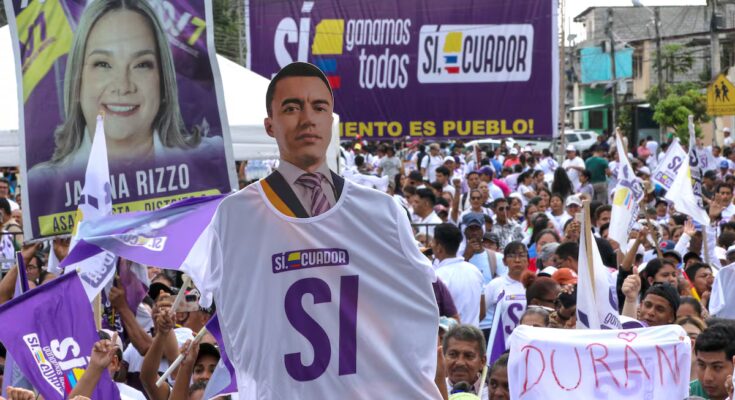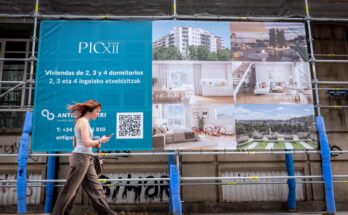The National Electoral Council of Ecuador (CNE) organized new elections in just 40 days, the third this year and the seventh round of elections in just two. This Sunday, November 16, Ecuadorians will vote again, at the invitation of President Daniel Noboa. This time they will not do it to elect the authorities, but to answer three questions that aim to reform the Constitution. Citizens will have to vote in favor of the presence of foreign military bases in the country, the elimination of the state’s obligation to finance political parties and the reduction of the number of assembly members. To these is added a fourth question, the most decisive: whether the country should open the door to a Constituent Assembly to develop a new Fundamental Law.
The nomination was so rushed that only 13 were assigned to the campaign. There was not enough time for an in-depth debate, nor for going door to door to explain the content of the questions and some, a few hours before the polls opened, do not even know what the contents of the ballots are. “Some bring benefits to the country, others less, but I’m not very clear because there is almost no information,” confesses Luis Serrano, a small trader from Guayaquil, as he adjusts the prices of his vegetables. For him the main concern is not constitutional reforms, but insecurity. “Without security we can’t work,” he says in a resigned tone. In his neighborhood, where violence is beginning to surround those who live there, he feels lucky not to be a victim of “vaccines”. “Everyone is subject to blackmail, we can’t even work in peace,” he adds, searching for a glimmer of hope in his words.
A few meters away, Gonzalo Abad, a pensioner with a laundry, didn’t even care to know what the questions were. “For what? Nothing they say will change what’s happening in the country. The only thing the president wants is for us to support him politically,” he says, clearly fed up with politics. He did not pay attention to the referendum questions because, according to him, their results will not change the daily reality that the country faces.
For political analyst Esteban Ron, this disaffection reflects the “intoxication” caused by a decade of non-stop electoral processes. In his opinion, the average citizen does not even know what a constituent process would entail, much less what reforming the Constitution would mean. Indeed, President Noboa has been reluctant to provide details. “First we win the elections and then I will tell you what we will do,” he replied when asked what his vision of the new law was.
Ron also points out that the founding process was not sincere. The last experience of this type, we recall, occurred 17 years ago, during the government of Rafael Correa. “People have not understood that, if the Constituent Assembly is approved, in February next year we would have to go back to the polls to elect the members of the Constituent Assembly, who would be proposed by the same political parties against which there is widespread rejection,” he warns. If the Constituent Assembly were imposed, the electoral calendar would be extended until 2027, as it would be necessary to vote for the new draft Constitution and, subsequently, call new general elections. “Only then will we be able to see the results of this new public management,” he concludes.
Ecuador, Ron argues, does not have time to undertake such profound reforms in the midst of a years-long social, economic and security crisis. The real question is whether the country needs a new Constitution or whether the priority should instead be to address the immediate problems of the population.
For political analyst Pamela León, the request for a new Fundamental Law in the current context responds less to a real need than to a political gesture full of symbolism. “Calling for a new Constitution is, to a large extent, an attempt to erase what remains of correlism in the state. It is an effort to ‘de-correlize’ the country’s institutions,” he says. León adds that, although these types of measures may have political utility, they will not solve the daily lives of citizens. “The government is rewriting the symbolic framework of the country starting from its own narrative, but this must not translate into concrete solutions for ordinary people”.
Meanwhile, the Executive enjoys relative political calm. The opposition, fragmented and without a common strategy, has not been able to face a state machine that, under the leadership of Daniel Noboa, operates without setbacks. With license to campaign, the president continued to govern, implemented a series of measures that strengthened his image: he distributed financial bonuses, announced the start of the maximum security prison he had promised to build – even though barely 40% of the work was completed – and, despite this, transferred more than 300 prisoners, including former vice-president Jorge Glas, the last bishop of Correism.
At the same time, the country was the scene of daily police operations in which, according to the authorities, the most dangerous criminals were arrested. Furthermore, public institutions were active protagonists of the campaign in favor of the “yes”, without the National Electoral Council having adopted any sanctioning measures. In this context, Noboa managed to consolidate his narrative, without major obstacles, also supported by a media machine that managed to align them with his government.



